Let me guess. You’ve either seen kombucha at your local Whole Foods Market or your friend won’t stop yapping on about it.
Maybe you’ve even tried it.
And now you’re curious to learn what the heck you’re drinking, why it smells like vinegar and if it’s normal to have some weird floaty things swirling around in it.
But the biggest question you probably want answered is whether it’s keto-friendly and if you can ever drink kombucha on a keto diet.

Lucky for you, these questions and more will be answered in today’s guide. You’ll learn:
What is Kombucha?
Don’t be intimidated by the unusual name. Kombucha (pronounced kômˈbo͞oCHə) is simply a fermented tea.
It starts out with a sweet tea base (usually a combination of black or green tea and sugar). Then a SCOBY, or Symbiotic Culture Of Bacteria and Yeast, is added — and that’s how all the magic happens.
This SCOBY lives in the tea and floats around like a super thick, legless jellyfish for a few weeks.
It’s the crucial ingredient that ferments and transforms the sweet tea into a probiotic-rich, naturally carbonated masterpiece.
Because of this fermentation process, kombucha shares similar gut-balancing properties as healthy fermented foods like unpasteurized kimchi and sauerkraut, miso soup and traditionally made (lacto-fermented) pickles.
And that’s only the beginning of its health claims.
The Health Benefits of Fermented Drinks
You just learned that kombucha is essentially a sweet tea packed with bacteria.
Sounds super gross, right? So why are people drinking this stuff?
It’s not a new trend. Kombucha, and similar fermented drinks, have been around for centuries. And thanks to everyone’s growing obsession with probiotics and gut health, fermented foods and drinks are growing in popularity — especially here in the states.
The bacteria and yeast combination found in these fermented foods and drinks may help balance gut bacteria, helping populations of “good” bacteria thrive and crowd out “bad” gut bacteria [*].
Poor diets, stress, pollution, monthly hormonal fluctuations and even drinking alcohol and caffeine can throw off the natural balance of your gut bacteria.
When you have too much “bad” bacteria here, you’ll usually suffer from uncomfortable digestive issues and other irritating symptoms such as:
- Gas and bloating
- Persistent diarrhea
- Constipation
- Candida overgrowth
- Bladder infections
To combat these unwanted side effects, rebalancing your gut bacteria levels is necessary so that you have a healthy mix of good and bad bacteria.
You can do that, in part, by eating and drinking fermented foods such as kombucha since they contain probiotics along with antimicrobial, bacteria-fighting properties.
As for the specific health benefits associated with kombucha, the current research has only been done on rats — but so far it’s promising.
Here’s what scientists discovered in animal studies:
- It may help treat or prevent prostate cancer[*]
- It reduced cholesterol levels[*]
- It helped diabetic rats decrease their blood sugar levels[*]
There’s plenty of anecdotal (first-person accounts) of kombucha’s benefits, too. If you ask die-hard kombucha fans, they’ll swear that it’s helped them with:
- Hangovers
- Boosting sluggish metabolisms
- Reducing kidney stones
- Improving energy levels
- Restoring homeostasis in the body
- Reduced sugar cravings
- ladder infections
While these benefits of kombucha tea may be true, they haven’t been proven in humans at this point. That also brings us to another dilemma.
If you’re in ketosis or trying to reach it, is kombucha even okay to drink?
Experience Antioxidant Richness
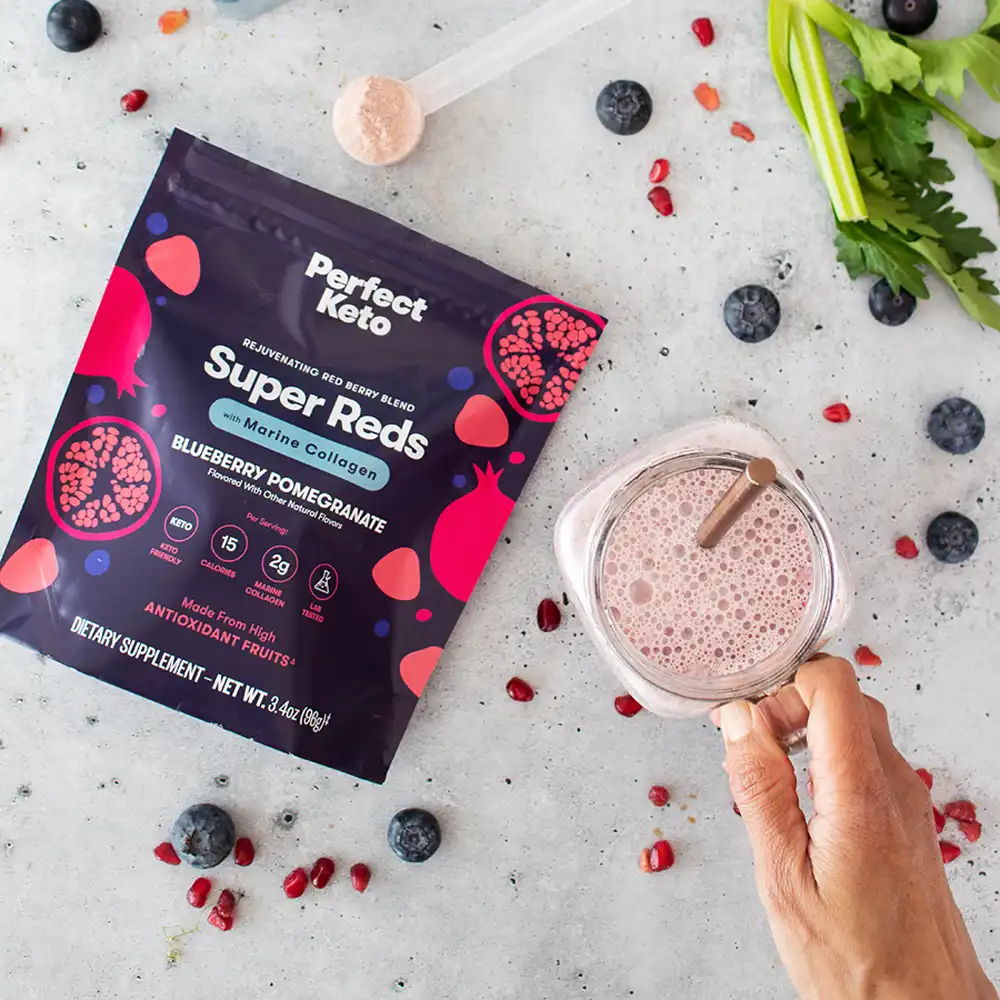
Super Reds Blend – Protect from Aging, Boost Energy, Enhance Skin Health. Savor the Refreshing Taste of Powerful Fruits.
Will Kombucha Knock You Out of Ketosis?
Just like with dairy, kombucha is keto friendly, with a few exceptions. Before we dive into those, there’s one key understanding to sort out here.
How It’s Made Matters
We already mentioned that kombucha is made from a sweet tea base. If you know anything about sweet tea, you know it’s loaded with sugar.
Does this mean kombucha is some magical keto loophole?
Not exactly.
The SCOBY actually feeds off the mountain of sugar that’s added to the tea. This is what it thrives on for weeks and how it has the energy to ferment in the first place. Sugar gives all forms of life energy.
Lucky for keto-ers, the SCOBY is also what burns through all the sugar that’s initially added.
What’s left is a low sugar, low carb drink that’s fairly easy on the palate if you don’t mind a hint of vinegar.
There’s no getting around this slight tart, vinegary taste. And for newbie kombucha drinkers, it can be off putting.
Because of this, many commercial brands of kombucha choose to do what’s known as a double fermentation process where different flavors and fruits are added. This updated mixture sits for a few more weeks to ferment further.
This time, the end result is not keto friendly!
These versions of kombucha are loaded with both carbs and sugar. So if you drink them, you’ll definitely be kicked out of ketosis.
If you’re careful to only consume low carb brands and flavors of kombucha, you’ll typically only see a slight shift in your ketone levels and they should return to normal within a few hours. Meaning, you can totally enjoy kombucha in moderation on a keto diet.
However, that’s only if you also consider the nutritional breakdown before doing so — and adjust your food intake accordingly.
How to Enjoy Kombucha on a Ketogenic Diet
Many store bought bottles of kombucha actually contain two servings. So if you’re not taking this into account, you could end up reaching half your carb count for the entire day in just one bottle — even if it’s unflavored.
Take this extremely popular kombucha for example[*]:
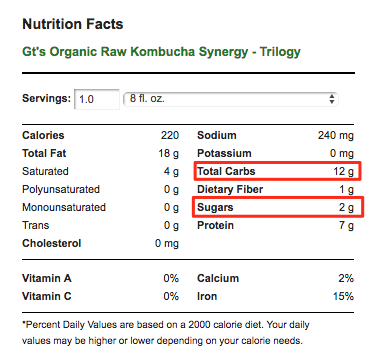
In just half the bottle, you’ll sip on 12 grams of carbs and 2 grams of sugar — and that’s in a raw, unflavored kombucha.
Just for fun, here’s what one flavored option that contains both stevia and sugar would give you:
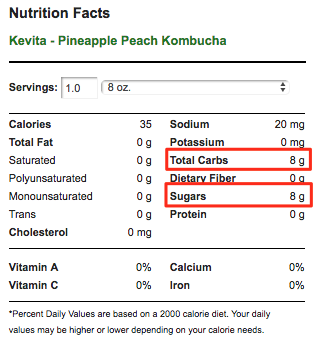
Notice that this brand’s flavored version has less carbs than the other one’s unflavored option yet it still packs 6 grams of extra sugar due to the sweet fruit that’s been added.
This popular mango flavor comes in at 12 grams of carbs and 10 grams of sugar for half the bottle:
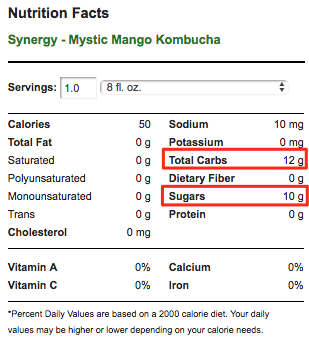
As you can see, if you’re going to add kombucha to your low carb life, you need to pay attention to the labels and serving sizes before you purchase any store bought options.
So how much kombucha can you drink on a keto diet?
Since you’re counting your macros diligently, you should have no more than a half serving of a lower carb kombucha every once in a while.
That would contain about 3.5 grams of carbs.
Keto-Friendly Kombucha and Other Fermented Drinks
Reaching for a low -carb kombucha tea option, like Health-Ade, is key. But kombucha isn’t your only option for sipping down nice dose of gut-friendly probiotics.
Kevita makes a tasty Lemon Cayenne fermented probiotic drink that’s similar to kombucha without all the carbs.
It has the sweet taste of lemonade (thanks to stevia, an acceptable low carb keto diet sweetener) with a kick of spiciness and half a serving only costs you 1 gram of carbs, 1 gram of sugar and 5 calories.
This means you could safely enjoy the whole bottle.
See for yourself[*]:

Suja also has a probiotic drink that’s similar to a pink lemonade and perfect for your post-yoga thirst or summertime lemonade swap.
It contains stevia and for the entire bottle you’ll only fork over 5 grams of carbs, 0 grams of sugar, and 20 calories[*]:
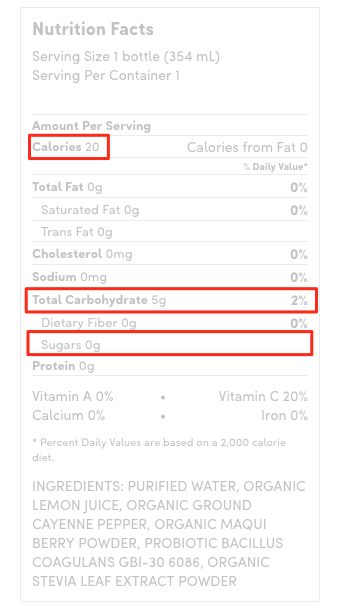
The best part is, when you’re in ketosis, sugar usually tastes 10x sweeter than usual, so you probably won’t even need to drink the whole bottle in one sitting to feel satisfied.
Another great keto-friendly kombucha option is this one that’s mixed with chia seeds[*]:

Thanks to those powerful little fiber–packed seeds, the net carb count of this kombucha drops down to 4 grams per 8-ounce serving. It also delivers 3 grams of fat and 2 grams of protein, which the other varieties don’t offer.
There’s one more way to cut the carb count of kombucha to virtually zero, but it involves a bit more work.
Homebrewing Kombucha: First-timers Beware
Buying kombucha may be more expensive than water or soda, but buying it here and there won’t necessarily break your budget. A bottle can run you anywhere from $3 to $7 depending on where you live.
But if you consume it enough, you’ll quickly blow through your budget.
That’s why many kombucha devotees turn to homebrewing.
Not only can this help you produce your own supply very quickly and cheaply, it can also help you drastically slash your kombucha’s carb count.
The longer the mixture has to sit and ferment, the less sugars will end up in the final product. So you can maintain a much better level of carb control when you brew kombucha at home.
But before you run off to buy a homebrewing kit, there are a few important things to consider.
For one, you’re dealing with bacteria here.
If the slightest bit of contamination comes into contact with your SCOBY or your brewed tea, it can make you really sick — like food poisoning sick[*].
Not only that, it can be hard for inexperienced brewers to decipher what’s healthy bacteria growth and what’s potentially harmful.
A good rule of thumb: if you notice anything that looks like the moldy fuzz you’d find on bread, your SCOBY has been contaminated and should be tossed ASAP.
The next challenge to homebrewing is controlling the temperature.
For the SCOBY to grow safely, it needs to be in an environment that’s around 68–86 degrees Fahrenheit.
From my homebrewing experience, I live in a normally hot climate where my house hovers around 75–76 degrees all day. We hit an unexpected cold front and the house dropped to around 67–68 degrees overnight.
While I was enjoying the cooler temps, my SCOBY was in major jeopardy of not only dying but turning into a germ-filled cesspool. I quickly had to wrap it in towels and put a heater on it just to get it to a safer temperature.
Fortunately, this whole process didn’t take long and the SCOBY was saved. But it’s definitely something to consider.
If you can’t maintain a healthy environment that’s consistently between 68–86 degrees, homebrewing kombucha may not be right for you.
Keep in mind, your kombucha mixture also needs to live in a dark place for a few weeks and it cannot be disturbed.
Do you have an out-of-the-way space like this where your SCOBY can go untouched for weeks?
And are you able to keep everything germ-free for months on end?
Your SCOBY cannot come into contact with any other forms of bacteria so you will constantly be cleaning things.
You’ll need to repeatedly wash your containers, bottles, hands and surfaces and then ensure everyone in your house follows the same rules.
There are two more issues that I ran into with homebrewing.
#1: The SCOBY Hotel
Each time you brew a batch of kombucha, your mother SCOBY produces a baby.
You can use these two SCOBYs to brew two more batches or to brew a batch and create a SCOBY hotel.
A SCOBY hotel is simply a place where all of your SCOBYs live before they’re added to new batches.
What most people don’t realize is that the SCOBYs end up multiplying really fast.
After two batches, I had a full blown SCOBY hotel and they just kept multiplying.
Now you’re talking about additional storage, more maintenance to keep the hotel thriving and safe from bacteria and more supplies. Basically, everything tripled overnight.
This means that your time investment will also go up significantly, which you need to be prepared for.
You’ll need to brew, bottle, consume and rebrew on a consistent basis.
Personally, this became too much work and it was something I could not maintain, even if it was cost effective. It required so much work and cleaning — lots of cleaning.
But this helped me learn another important lesson about homebrewing:
#2: Kombucha is Not Right For Everyone
After homebrewing for months, I found out the hard way that the kombucha was flaring up my asthma and allergy symptoms.
Turns out, for some people, the yeast in fermented foods can aggravate allergies and may trigger an asthma attack in the same way environmental allergens do.
So whether it’s keto-friendly or not, if you have these types of issues, kombucha can make things worse.
In the end, it may or may not be right for you to consume, but only you and your doctor can make that decision.
Enjoy Kombucha on Keto
Kombucha tea can definitely be a keto-friendly beverage option on a ketogenic diet — provided you take time to check out the nutrition label.
Select only brands that contain low enough carb and sugar counts to stay in line with your daily macronutrient goals. Or if you’re even more committed, try your hand at home brewing kombucha to reduce the carb and sugar count even lower.
For those readers in this boat, use this tried-and-tested recipe from The Kombucha Shop[*][*]:
Ingredients
- 10 cups of filtered water
- 1 cup of sugar
- 3 tablespoons caffeinated black, green or oolong loose leaf tea
- SCOBY
Instructions
- Bring 4 cups of filtered water to a boil, take this off the heat, and then add the tea.
- Let this infuse for anywhere between 5-7 minutes.
- Once that’s done, add the cup of sugar and stir until dissolved.
- From here, you’ll need to add about 6 cups of cold filtered water to your jar to cool the entire mix off.
- When the jar’s temperature drops down to the 68-84 F range, you can then add your SCOBY, stir, and test the pH level.
- If your pH level is 4.5 or lower, you can then cover your container with a cotton cloth and let it ferment for approximately 7-9 days before taste testing.
- For a stronger brew, let the mix sit longer. And if the vinegary taste is not your thing, stick to the 7-9 window.
But that doesn’t mean you have to drink kombucha either.
If you don’t like the taste or if you’re like me and have asthma, kombucha and other fermented foods may not be the right choice for you. The key is to find out what works for your body and run with that.
And don’t be entranced by the health claims just yet. Until we have more conclusive research on how kombucha affects human health, the kombucha craze is best met with cautious optimism.